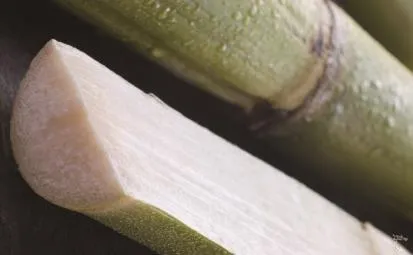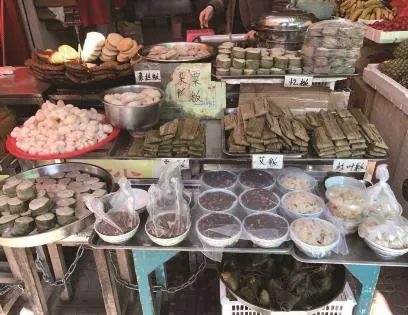CELEBRATING THE QINGMING FESTIVAL IN CANTON
CELEBRATING THE QINGMING FESTIVAL IN CANTON
Although the weather may still be a little chilly around this time of the year, “coldness” is not the impression that Chinese people hold for Qingming. They wish for a booming season and a fruitful year through the celebration of the festival.
Text by Yanlin Ma Translation by Leo Photos by Dongfang IC, Kyle Huang Illustration by Dana Lin
When pear trees are blossoming, it is time to celebrate the Qingming Festival, or Tomb-Sweeping Day, when people go out of the town for spring outings. Qingming, meaning clear and bright sky, and flourishing plants, is one of the 24 Solar Terms of China and has been an important traditional festival among Chinese folks for more than 2,500 years. During this period of time, in addition to the most popular customs like remembering and honouring their ancestors, Chinese people also celebrate it by participating in various fun activities, such as spring outings, playing on swings, Cuju (an ancient Chinese ball game), polo, and planting willow branches. In Guangdong province, the festival is celebrated in many different ways with practices varying from one village to another.
Since antiquity, Qingming has been a perfect time for making fleld trips and spring outings as the weather is getting warmer and everything is coming to life again. Girls and boys are dating and even business in the markets is booming. The painting Along the River During the Qingming Festival by the Song dynasty artist Zhang Zeduan (1085–1145) captures the festive spirit and worldly commotion upon the festival among people along Bianhe River in Bianliang (today's Kaifeng City of Henan Province).
Though folk customs vary from place to place, people's expectations for joy and happiness, a reunion of family, a good start of the year and a beautiful spring season remain the same everywhere.
“清明”含天气晴朗、草木繁茂之意;同时也是中国民间重要传统节日,已有2500多年的历史。
时值清明时节,民间除了缅怀先人的常见习俗之外,还有踏青、荡秋千、蹴鞠、打马球、插柳等一系列颇有趣味的活动。全国风俗各异,而广东自然也有其独有的清明风俗。
清明时节自古便是 “赏春踏青”、春游赏花的大好时光。此时春暖花开,万物复苏,连男女莺情、市集买卖也都活跃起来了,从北宋时期流传下来的张泽端的《清明上河图》描绘的就是汴梁(开封)汴河两岸人民在清明时节活跃、丰富的社会活动。
“马穿杨柳嘶,人倚秋千笑,探莺花总教春醉倒。”清明并非只有 “冷清”,更多地是代表了人们对于万物复苏及未来一年的展望,无论是哪个地方的习俗,清明总有这样的期望:春到人笑,也是家人团聚之期;辞旧迎新,拥怀仲春美景。
清明探春
﹃梨花风起正清明,游子寻春半出城。﹄ 清明并非只有﹃冷清﹄,而是一个寄托了万物复苏的展望的时节。

Foshan
Planting willow branches in memory of a loyal minister
佛山•插柳
People of Foshan have the tradition of planting willow branches on the day of Qingming in commemoration of a minister named Jie Zitui from the state of Jin during the Spring and Autumn Period (770-476 BC), who was burnt to death under an old willow tree for his beliefs. The next year after his death, the tree came back to life again and was given the name of“Qingming Willow” by Duke Wen of Jin, the ruler of the state, upon a visit to Jie's tomb. The Duke took some twigs from the tree, weaved them into a wreath, and wore it on his head to cherish the memory of the minister. This practice then gained popularity among government offlcials and ordinary folks and gradually became a custom of the festival.
佛山有清明插柳的习俗,这个习俗是为纪念晋国大臣介子推:介子推为明志守节而焚身于大柳树下。第二年,老柳树死而复生。晋文公将老柳树赐名为“清明柳”,并且当场折下柳条戴在头上,以示怀念之情。从此以后,群臣百姓纷纷效仿,遂相沿成风。
Zhaoqing
Eating sugarcane
肇庆•吃甘蔗
Sugarcane implies joyful and sweet days. Young children are told by their parents to flnish the whole sugarcane from top to bottom without any waste. People believe that it can help shape children's characters to be more consistent and responsible.
甘蔗寓意欢欢喜喜、甜甜蜜蜜。 大人都会叮嘱小孩子,吃甘蔗要从头吃到尾,不能没吃完就扔掉。据说这样子以后做事情才会有头有尾,善始善终。


Meizhou
Making rice cake with mugwort
梅州•采撷艾叶做粄
Mugwort rice cake, made with rice and glutinous rice flour mixed with mugwort juice, is a Hakka snack of medical value. Featuring a unique fragrance from the wild herb, this snack not only disperses excessive wind and dampness in the human body, but it is also quite effective in expelling internal parasites. These qualities make it perfect for the humid spring season. This tradition of having Qingming rice cake has been passed down from generation to generation in Hakka communities around the world.
艾粄,客家菜,用粘米粉、糯米粉、艾草等做成,有一定的药用保健功能。这种小食拥有一股独特的山野青草芳香,不仅可以祛风祛湿,还有驱除体内寄生虫的奇效,最适合天气潮湿的春天食用,因此这种习俗在客家地区代代相传。
Guangzhou
Mustard leaves, a must-have Qingming food
广州•清明荞菜
Qingming has always been a signiflcant festival for traditional Cantonese folks. One of the practices is go for a Qingming outing. It differs from a regular spring outing in that the Qingming outing is when a clan of people pays a visit to their ancestors together on an appointed day.
What's special about this custom is that the dishes presented to the ancestors as offerings will later be sautéed with mustard leaves and shared among descendants. It is only after all the dishes are consumed that the purpose of the Qingming outing is considered to be achieved.
传统的广州人向来重视清明,在清明当日有“行清”的习俗。“行清”与踏青不同,踏青是郊游,“行清”则是一族人一起约定那一天齐齐去“探望”祖先。
最特别的是,那些供奉过祖先的菜肴,要配上清明时节的菜蔬“清明荞菜”去炒着吃,吃完了这些菜肉,这一年的“行清”任务才算完成。


